Related Research Articles

David Bennett Hill was an American politician from New York who was the 29th Governor of New York from 1885 to 1891 and represented New York in the United States Senate from 1892 to 1897.
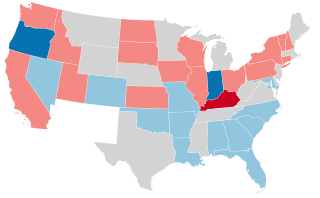
The 1908–09 United States Senate elections were held on various dates in various states. As these U.S. Senate elections were prior to the ratification of the Seventeenth Amendment in 1913, senators were primarily chosen by state legislatures. Senators were elected over a wide range of time throughout 1906 and 1907, and a seat may have been filled months late or remained vacant due to legislative deadlock. However, some states had already begun direct elections during this time. Oregon pioneered direct election and experimented with different measures over several years until it succeeded in 1907. Soon after, Nebraska followed suit and laid the foundation for other states to adopt measures reflecting the people's will. By 1912, as many as 29 states elected senators either as nominees of their party's primary or in conjunction with a general election.

The 1833 United States Senate special election in New York was held on January 4, 1833, by the New York State Legislature to elect a U.S. Senator to represent the State of New York in the United States Senate.

The 1837 United States Senate election in New York was held on February 7, 1837, by the New York State Legislature to elect a U.S. Senator to represent the State of New York in the United States Senate.

The 1843 United States Senate election in New York was held on February 7, 1843, by the New York State Legislature to elect a U.S. Senator to represent the State of New York in the United States Senate.

The 1845 United States Senate special election in New York was held on January 18, 1845 by the New York State Legislature to elect two U.S. Senators to represent the State of New York in the United States Senate. The regular 1845 United States Senate election in New York was held on February 4, 1845, to elect a U.S. Senator to represent the State of New York in the United States Senate.

The 1857 United States Senate election in New York was held on February 3, 1857 by the New York State Legislature. Incumbent Whig Senator Hamilton Fish did not stand for re-election. The seat was won by Preston King, a former U.S. Representative and member of the newly-formed Republican Party. King was the first Republican elected to represent New York, although William H. Seward had joined the party after being elected as a Whig in 1855.

The 1856–57 United States Senate elections were held on various dates in various states. As these U.S. Senate elections were prior to the ratification of the Seventeenth Amendment in 1913, senators were chosen by state legislatures. Senators were elected over a wide range of time throughout 1856 and 1857, and a seat may have been filled months late or remained vacant due to legislative deadlock. In these elections, terms were up for the senators in Class 1.

The 1904–05 United States Senate elections were held on various dates in various states, coinciding with President Theodore Roosevelt's landslide election to a full term and the 1904 House of Representatives elections. As these U.S. Senate elections were prior to the ratification of the Seventeenth Amendment in 1913, senators were chosen by state legislatures. Senators were elected over a wide range of time throughout 1904 and 1905, and a seat may have been filled months late or remained vacant due to legislative deadlock. In these elections, terms were up for the senators in Class 1.
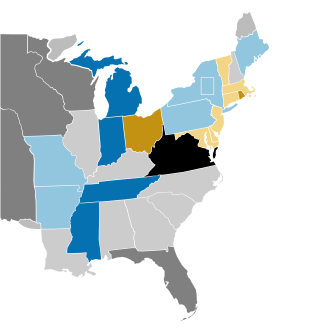
The 1844–45 United States Senate elections were held on various dates in various states, coinciding with James K. Polk's election. As these U.S. Senate elections were prior to the ratification of the Seventeenth Amendment in 1913, senators were chosen by state legislatures. Senators were elected over a wide range of time throughout 1844 and 1845, and a seat may have been filled months late or remained vacant due to legislative deadlock. In these elections, terms were up for the senators in Class 1.
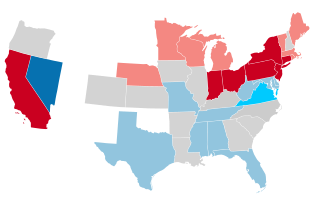
The 1880–81 United States Senate elections were held on various dates in various states, coinciding with the presidential election of 1880. As these U.S. Senate elections were prior to the ratification of the Seventeenth Amendment in 1913, senators were chosen by state legislatures. Senators were elected over a wide range of time throughout 1880 and 1881, and a seat may have been filled months late or remained vacant due to legislative deadlock. In these elections, terms were up for the senators in Class 1.
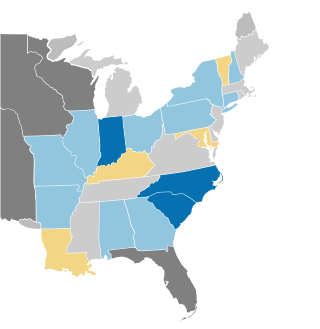
The 1842–43 United States Senate elections were held on various dates in various states. As these U.S. Senate elections were prior to the ratification of the Seventeenth Amendment in 1913, senators were chosen by state legislatures. Senators were elected over a wide range of time throughout 1842 and 1843, and a seat may have been filled months late or remained vacant due to legislative deadlock. In these elections, terms were up for the senators in Class 3.

The 1840–41 United States Senate elections were held on various dates in various states. As these U.S. Senate elections were prior to the ratification of the Seventeenth Amendment in 1913, senators were chosen by state legislatures. Senators were elected over a wide range of time throughout 1840 and 1841, and a seat may have been filled months late or remained vacant due to legislative deadlock. In these elections, terms were up for the senators in Class 2.
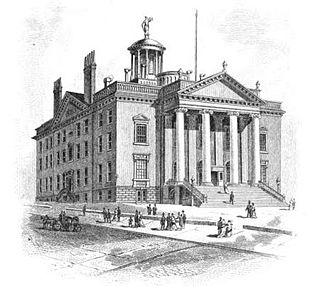
The 66th New York State Legislature, consisting of the New York State Senate and the New York State Assembly, met from January 3 to April 18, 1843, during the first year of William C. Bouck's governorship, in Albany.

The 67th New York State Legislature, consisting of the New York State Senate and the New York State Assembly, met from January 2 to May 7, 1844, during the second year of William C. Bouck's governorship, in Albany.

Michael J. Coffey (c. 1840 – March 23, 1907 was an American politician from New York who served in the American Civil War and was an influential Democrat in New York City in the latter half of the 19th century.

The 195th New York State Legislature, consisting of the New York State Senate and the New York State Assembly, met from January 8, 2003, to December 31, 2004, during the ninth and tenth years of George Pataki's governorship, in Albany.

The 202nd New York State Legislature, consisting of the New York State Senate and the New York State Assembly, met from January 4, 2017, to December 31, 2018, during the seventh and eighth years of Andrew Cuomo's governorship, in Albany
James Francis Donahue was an American merchant and politician from New York.

The 1843 Vermont gubernatorial election was held on September 5, 1843.
References
- ↑ The New York State Register, for 1843. 1843. p. 327.
- ↑ Documents of the Assembly of the State of New York. New York State Legislature. 1852. p. 256.
- ↑ Niles' National Register (issue of December 3, 1842; pg. 211f)